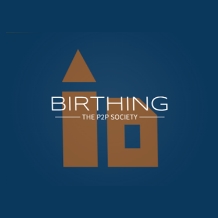
BIRTHING the P2P Society
Directors
Key partners
Timeframe
Context, conceptual framework, and aims
Digitalization is the defining technological mega-trend of our time. It holds contradictory potentials, enabling both emancipation and control, revolution and repression. While it fuels platform capitalism, it also opens space for global self-organization and alternative production models rooted in the commons.
BIRTHING the P2P Society is a multi-stage action research program aimed at researching and creating enabling conditions for the emergence of a peer-to-peer economy at scale, setting in motion a virtuous circle of social, cultural, and ecological transformations. Drawing on the findings previous research, BIRTHING explores the potential and challenges of the church as a mediating institutional partner to facilitate the creation of such favorable conditions for a P2P breakthrough in the general technological context of the “digital revolution”.
Peer-to-peer (P2P) refers to distributed models of organization, production, and value exchange based on the direct collaboration of individuals or groups, without reliance on centralized authorities or traditional market mechanisms. Real-world examples of P2P production include Open-source software (e.g., Linux, Wikipedia), distributed manufacturing (e.g., makerspaces, FabLabs), cooperative platforms (e.g., platform cooperativism), and blockchain-based governance and currencies.
Cosmolocalism: A Commons-Based Alternative
Among these models, “cosmolocalism” emerges as a noteworthy concept (Irwin, 2015; Kossoff, 2019; Schismenos et al., 2019; Kostakis et al., 2023). Demonstrated in experimental settings across makerspaces worldwide, cosmolocalism transcends the label of mere fringe experiments sanctioned by the system. Instead, these spaces manifest as windows of opportunity, beckoning a new politics of potentiality towards post-growth.
However, its scalability is hindered by the absence of a supportive legal framework, lack of institutionalization, and insufficient physical infrastructure (Kostakis et al., 2023). These limitations hinder the evolution of cosmolocalism into a scalable, systemic alternative.
The Church as a Strategic Ally
The BIRTHING the P2P Society program explores how the Catholic Church and the broader ecumenical sphere could become institutional allies in advancing cosmolocalism (Beling, 2023; Beling & Kostakis, 2024). With its global reach, moral authority, and underutilized infrastructure, the Church is uniquely positioned to:
- Advocate for supportive legal frameworks.
- Repurpose dormant buildings into makerspaces.
- Streamline institutionalization of cosmolocal practices, balancing local autonomy with global coordination
- Provide political and cultural legitimacy to commons-based production.
Cosmolocalism offers a practical, scalable direction for realizing religious mandates to care for creation and advance social justice, through:
- Commons-based production and repair services
- Partnerships with schools, universities, and civil society
- Convivial technologies that bridge faith and secular cultures
Toward a prosperous post-growth Future
By aligning with the cosmolocal movement, the Church can help catalyze a post-growth transition rooted in justice, sustainability, and community. Makerspaces become not just sites of production, but hubs of social learning, dialogue, and transformation—where faith and technology converge to reimagine the future.